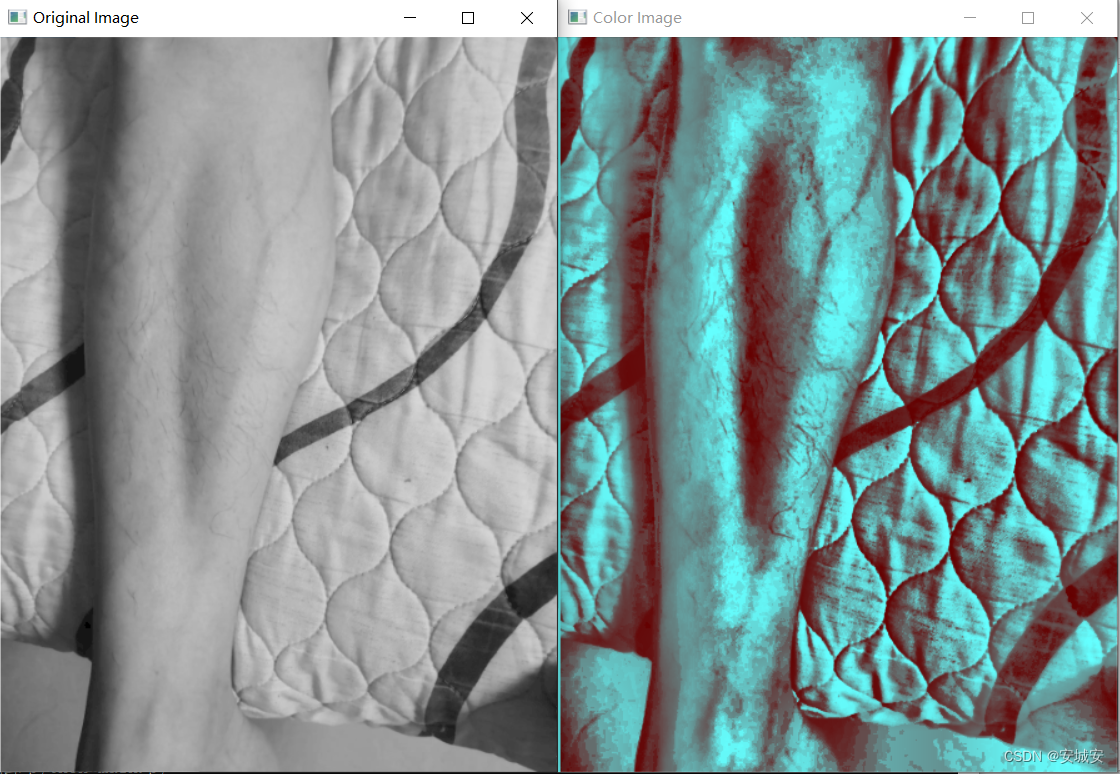相关推荐recommended
- 【MySQL新手入门系列一】:手把手教你入门MySQL
- 关于nginx一个域名,配置多个端口https的方法
- 【已解决】Spring常见错误:类文件具有错误的版本 61.0, 应为
- 数据库实战:基于Tkinter+MySQL的学生成绩管理系统
- 【网络安全带你练爬虫-100练】第6练:内嵌发包提取数据
- RabbitMQ延时队列的详细介绍以及Java代码实现
- 沉浸式go-cache源码阅读!
- Tomcat在linux环境中开机自启(定时重启)
- 第一章 SQL Server 数据库部署
- MySQL --- 图形化工具&DDL表结构操作
- 关于部署vue项目在Linux上的两种方式tomcat以及nignx(
- centOS7 Mysql启动失败报错Job for mysqld.s
- Springboot自定义ThreadPoolTaskExecutor
- 计算机毕业设计springboot基于微信小程序的餐厅点餐系统的设计与
- Thymeleaf详细教程(SpringBoot版)
- 【实用】Mysql 按照时间(年月周日)维度统计,不存在时间数据 自动
- 基于flask的web应用开发——访问漂亮的html页面以及页面跳转
- vue2 组件传递数据
- MySQL8 详细安装步骤 【附安装包】
- SpringBoot+Redis完成数据缓存(内容丰富度一定超出你的想
- SpringGateway网关
- SpringBoot3之配置文件(学习SpringBoot3的配置这一
- 10个你需要知道的SpringBoot参数验证的技巧
- Python |浅谈爬虫的由来
- Dubbo快速入门 —— 基于SpringBoot Starter 开
- (附源码)基于Android的订餐app 毕业设计 190711
- Mysql用户创建以及权限赋予操作
- 项目实战之RabbitMQ重试机制进行消息补偿通知
- JSP课设:学生信息管理系统(附源码+调试)
- Mysql字符串截取
python识别增强静脉清晰度 opencv-python图像处理案例
作者:mmseoamin日期:2023-12-19
一.任务说明
用python实现静脉清晰度提升。
二.代码实现
import cv2
import numpy as np
def enhance_blood_vessels(image):
# 调整图像对比度和亮度
enhanced_image = cv2.convertScaleAbs(image, alpha=0.5, beta=100)
# 应用CLAHE(对比度受限的自适应直方图均衡化)
clahe = cv2.createCLAHE(clipLimit=30.0, tileGridSize=(8, 8))
enhanced_image = clahe.apply(enhanced_image)
# 应用中值滤波平滑图像
enhanced_image = cv2.medianBlur(enhanced_image, 1)
return enhanced_image
def extract_blood_vessels(image):
# 阈值分割提取静脉血管
ret, thresholded_image = cv2.threshold(image, 100, 255, cv2.THRESH_BINARY)
# 使用形态学操作(膨胀和腐蚀)进一步清理和连接血管
kernel = np.ones((3, 3), np.uint8)
thresholded_image = cv2.morphologyEx(thresholded_image, cv2.MORPH_OPEN, kernel)
return thresholded_image
# 读取图像
image = cv2.imread('input-pic.png', cv2.IMREAD_GRAYSCALE)
# 图像增强
enhanced_image = enhance_blood_vessels(image)
# 提取静脉血管
vessels_image = extract_blood_vessels(enhanced_image)
# 将灰度图转换为彩色图
color_image = np.zeros((enhanced_image.shape[0], enhanced_image.shape[1], 3), dtype=np.uint8)
for i in range(enhanced_image.shape[0]):
for j in range(enhanced_image.shape[1]):
color_image[i][j] = (enhanced_image[i][j], enhanced_image[i][j], 100) # 使用灰度值作为RGB通道的值
# 显示彩色图
cv2.imshow('Color Image', color_image)
# 显示图像
cv2.imshow('Original Image', image)
cv2.imshow('Enhanced Image', enhanced_image)
cv2.imshow('Blood Vessels', vessels_image)
cv2.waitKey(0)
cv2.destroyAllWindows()
三.识别效果















